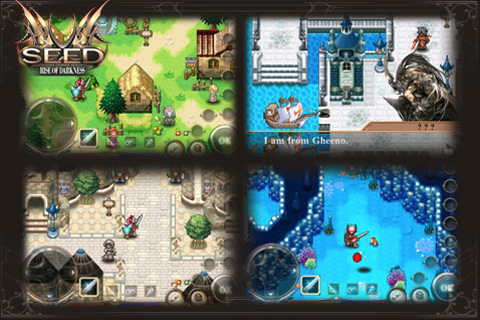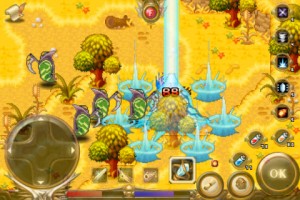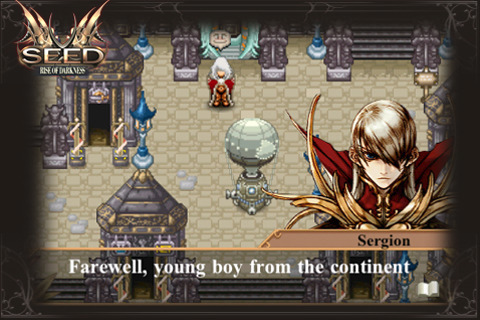 The latest RPG to emerge from the Chillingo publishing factory is Seed 1- Rise of Darkness [App Store], a port of an existing Japanese mobile game by CH Games and a title we had been eagerly anticipating thanks to an eye-catching trailer released earlier this year.
The latest RPG to emerge from the Chillingo publishing factory is Seed 1- Rise of Darkness [App Store], a port of an existing Japanese mobile game by CH Games and a title we had been eagerly anticipating thanks to an eye-catching trailer released earlier this year.
Seed’s App Store approval comes at the same time as a raft of other RPGs, our recently review of Inotia 2 placing it firmly at the top of this list. It is unavoidable then that comparisons between Seed and Inotia 2 will be made seeing as how these two comprise the more substantive of the lot. Adding a twist is the fact that Chillingo has recently made Seed into a free game to rely entirely on in-app purchasing for their revenue stream. Seed originally launched at $2.99. So how does Seed stack up?
From the very start, it is clear that Seed’s port to the iPhone has delivered a mixed bag of results. The graphics, whilst rich in color and detail, have suffered in quality by having its textures scaled to the larger device. As such, the world of Koolikoop does have a blurred-look when compared to Inotia 2’s ultra crisp graphics. Still, the character and enemy detail is impressive, particularly considering the large number of various armor sets and weapons available, each of which have a distinct look when applied to your character.
Seed is a real-time action-RPG, taking its cue from wildly popular console franchises such as Secret of Mana. Its class-based system departs from the traditional mould by recognising your class depending on the weapon you wield the most– the sword, lance, gun or staff. Magic can only be cast while wielding a staff, but all classes have a range of skills that are unlocked by learning them from NPCs, and strengthened by subsequent use of that weapon in combat.

One thing is apparent from playing with each of the classes– Seed heavily favors the melee classes until the latter game, at which stage magic and long-range attacks become near-unstoppable. In the early game however, these classes are beyond frustrating to play, particularly the cumbersome wizard class where often you cannot put out enough damage to counter even 1 enemy, let alone facing multiple assailants. This is exacerbated by a clumsy aiming system where casting a spell even a fraction off center will completely miss enemies and leave you with a nothing but a sorely depleted magic bar.
To make matters worse, the iPhone port of Seed suffers from awkward movement controls, a fact highlighted in combat. A four-direction D-pad is present on screen at all times, but is either far too responsive or fails to register inputs altogether, meaning that your evasive or positional actions are more often than not fruitless. Mastering the controls in Seed involves you schooling yourself into a tedious rhythm of light touches and care with your attack button lest it interfere with your movement; something that certainly holds back the gameplay. A patch has already been submitted by Chillingo addressing the virtual key pad, but whether this will remedy the above issues is yet to be seen.
 Beyond these setbacks, the actual combat in Seed is fun for the most part when it works, and increasingly so once you have built your character up with a variety of attacks or spells. The skills are all mostly interesting to use, though they never look spectacular, which is disappointing for some of the bigger magical attacks. The monster types are varied and numerous even from the outset, each having different attack patterns to learn and combat. It may help to tone down the game speed when you first fire Seed up though, as the combat can be quite unforgiving at its default speed, and a bit more strategy is employable by slowing the game down a notch.
Beyond these setbacks, the actual combat in Seed is fun for the most part when it works, and increasingly so once you have built your character up with a variety of attacks or spells. The skills are all mostly interesting to use, though they never look spectacular, which is disappointing for some of the bigger magical attacks. The monster types are varied and numerous even from the outset, each having different attack patterns to learn and combat. It may help to tone down the game speed when you first fire Seed up though, as the combat can be quite unforgiving at its default speed, and a bit more strategy is employable by slowing the game down a notch.
While the underlying story in Seed may be a shining point, it is unfortunate then that the English translations often leave you scratching your head, and that the dialogue is bogged down by so many gratuitous, cringe-evoking cliches and over-enthusiastic, uninspired characters that they often mar the substance of the story. This factor is also not helped by the multitude of grammatical errors that plague the script and tooltips throughout Seed; a fact that does impinge on gameplay at times as you struggle to decipher the difference between one potion and the next, or the actual effect of a particular attack.

Despite this, Seed does still have a good amount of depth. An equipment refining and socketing system allows you to enhance your gear, and a compounding system allows you to mix items to create more powerful variants to insert into sockets. Added to this is an in-app store where you can purchase full item sets and other beneficial but non-essential items for cash. This will assist lazy gamers looking for instant gratification and those stuck in the game who want that extra bit of help. A good deal of thought has been put into what items are actually available, and whilst they’re not necessary, many may find themselves lulled by the attractiveness of additional back space, or auto-item collection, to name a few.
Seed is a lengthy RPG that may appeal to the diehard fans of the genre, but will likely prove too frustrating and tedious for those looking for a refined and accessible RPG experience. Though it can compete with other popular action RPGs such as Zenonia, it never feels quite as polished, particularly against the recently released Inotia 2. Seed 1 – Rise of Darkness is the first in what appears to be an ongoing saga; one that we hope will be more refined as its sequels emerge.
A vast number of impressions have already collected in our discussion forums, particularly as the game has recently been made free, a fact surprising so soon after its release.
App Store Link: Seed 1 – Rise of Darkness, Free.